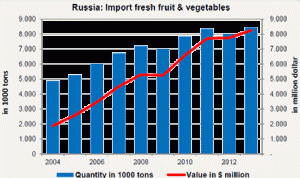 The Russian import market of fresh fruit and vegetables in 2013 was worth 8.2 billion dollars (6.2 billion Euro). Two years before it was 7.7 billion dollars. In 2011 and 2012 the value was 5.5 and 6.0 billion Euro respectively. Volume comparisons show last year figures at 8.4 million ton, compared to 8 in 2012 and 8.3 in 2011. Previous years showed imports increasing sharply.
The Russian import market of fresh fruit and vegetables in 2013 was worth 8.2 billion dollars (6.2 billion Euro). Two years before it was 7.7 billion dollars. In 2011 and 2012 the value was 5.5 and 6.0 billion Euro respectively. Volume comparisons show last year figures at 8.4 million ton, compared to 8 in 2012 and 8.3 in 2011. Previous years showed imports increasing sharply.
Apples and bananas are the two major products which are imported to Russia. Apple import continued to grow in 2013 but banana import was more modest. Tomatoes, the third import product showed good growth as did fourth place, soft citrus, then a number of products follow which reached a peak in 2011 but in recent years have fallen, these are oranges, pears, grapes and carrots. Onion import in 2013 was also seen to have been previously higher.
Ecuador is the most important supplier of fresh fruit and vegetables. This is mostly due to the banana. Ecuadorian bananas have a free monopoly on the Russian banana market. Turkey is the other massive supplier of fresh fruit and vegetables to Russia but import is not longer growing. Poland is rising as third supplier. Almost three quarters of Polish deliveries consists of apples. China follows in fourth place but their import shows a falling trend and apples, soft citrus and tomatoes are their most important products. Spanish import, number 5, has stabilised after a short spurt in 2013. The main Spanish products going to Russia are peaches/nectarines and tomatoes. Morocco also supply soft citrus, and Israel are a large supplier of products such as carrots and peppers.
